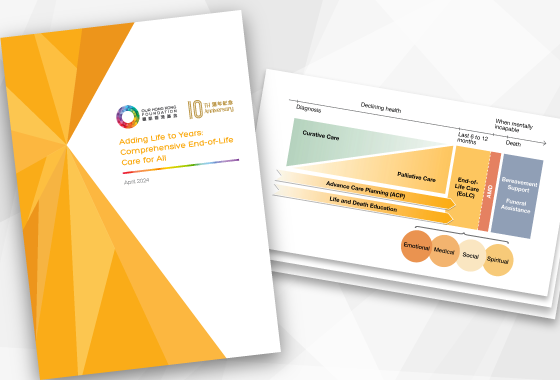Hong Kong people need more than an advance directive for a dignified death
This article appeared originally in South China Morning Post on 3 Jan, 2024.
Authors: Dicky Chow, Researcher, Dorothy Yeung, Assistant Researcher at Our Hong Kong Foundation
- The government’s support of advance directives on life-sustaining treatment is laudable but falls short of capturing the full spectrum of available care
- Advance care planning involves medical decisions as well as personal and social aspects of care. Hong Kong should roll out such protocols, as Singapore does

In Hong Kong, we are witnessing a growing recognition of the importance of providing our loved ones with a peaceful and dignified death. The government’s efforts to establish a legal framework for advance decisions on life-sustaining treatment, while commendable, represents only the first step towards this goal.
To better support people and their families in their final moments, we must adopt a wider perspective that goes beyond advance directives and embraces advance care planning.
While advance directives provide guidance on medical interventions when individuals can no longer speak for themselves, it falls short of capturing the full spectrum of care that matters most to those in the final stage of life. Advance care planning, on the other hand, takes a more comprehensive approach, encompassing not just medical decisions but also personal and social aspects of care.
It encourages proactively communicating one’s values, beliefs and preferences regarding both medical and personal care. Involving both family members and healthcare professionals, advance care planning aids in creating person-centred plans and signing legal documents that reflect people’s unique needs and preferences.
This collaborative approach ensures individuals’ wishes are respected and empowers family members to make informed decisions when their loved ones are unable to speak for themselves. Importantly, advance care planning is not limited to those in their final moments. It helps everyone, regardless of age or health, prepare so their future medical and personal care needs can be met.
Proactively engaging in advance care planning can help us live life to the fullest, ensuring our final days are shaped by our values and preferences instead of arbitrary decisions made during a crisis. We can then embrace our death with dignity, peace and the fulfilment of our needs.
While there are encouraging initiatives in Hong Kong such as advance care planning community programmes offered by NGOs and under Hospital Authority guidelines in public hospitals, the overall approach is fragmented. The absence of a unified framework hinders people from accessing comprehensive support, and the varying focuses of existing programmes can lead to gaps in planning for holistic care.
To fully realise the potential of advance care planning, we can learn from the example of Singapore, which has established a national advance care planning programme called “Living Matters”. By emphasising the importance of honouring patient autonomy and enhancing quality of life, Singapore seeks to reduce cultural taboos surrounding death, normalise conversations on advance care planning and increase public awareness of its importance.
Singapore has also taken steps to improve accessibility to advance care planning consultation by making it available in dozens of institutions and clinics. This widespread availability ensures people have access to advance care planning programmes and have their preferences documented.
Hong Kong should adopt a top-down approach to establish a comprehensive and standardised advance care planning protocol. Not only would this help people integrate their values, beliefs and preferences into care planning, it would enable service providers and family members to bring a holistic view to considering medical, social and personal needs.
To bolster the advance care planning process, Hong Kong should harness the strength of its primary care network. Given the heavy workload of specialists, we must leverage the extensive reach and expertise of community-based healthcare providers to make advance care planning more readily available. This collaborative approach would increase accessibility and ensure advance care planning becomes an integral part of healthcare for all Hongkongers.
We must also create an environment where advance care planning conversations are encouraged and normalised. By promoting it as a care planning tool for everyone, we can break down cultural barriers surrounding death and dying. This shift will help people make informed decisions about their care and foster a society that respects and values everyone’s dignity in their final moments.
Enhancing end-of-life care in Hong Kong requires a concerted effort from multiple sectors, from government and healthcare providers to community leaders and average Hongkongers. By adopting a comprehensive approach that includes legislation, a standardised advance care planning protocol, a robust service network and public education, we can ensure our loved ones receive the respect, comfort and support they deserve at the end of their lives.
We should embrace advance care planning as a valuable tool to empower people, aid informed decision-making and foster a culture of dignity and compassion for those facing the end of their lives.



